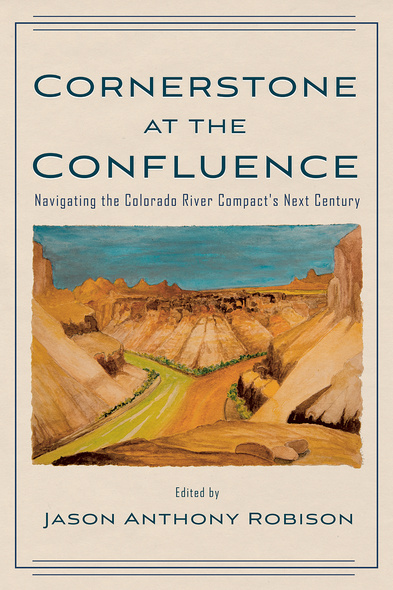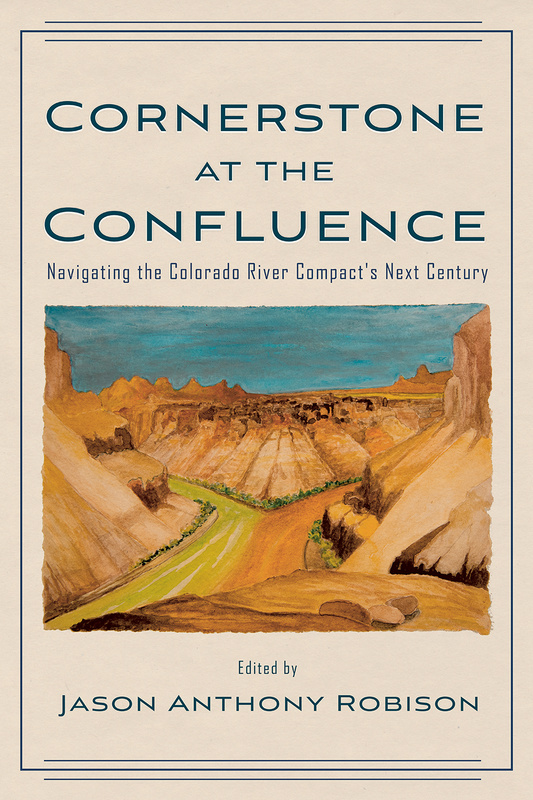
328 pages, 6 x 9
19 b&w illustrations, 11 color images
Paperback
Release Date:08 Nov 2022
ISBN:9780816547630
Hardcover
Release Date:08 Nov 2022
ISBN:9780816547647
Cornerstone at the Confluence
Navigating the Colorado River Compact's Next Century
Edited by Jason A. Robison
The University of Arizona Press
Signed on November 24, 1922, the Colorado River Compact is the cornerstone of a proverbial pyramid—an elaborate body of laws colloquially called the “Law of the River” that governs how human beings use water from the river system dubbed the “American Nile.”
No fewer than forty million people have come to rely on the Colorado River system in modern times—a river system immersed in an unprecedented, unrelenting megadrought for more than two decades. Attempting to navigate this “new normal,” policymakers are in the midst of negotiating new management rules for the river system, a process coinciding with the compact’s centennial that must be completed by 2026.
Animated by this remarkable confluence of events, Cornerstone at the Confluence leverages the centennial year to reflect on the compact and broader “Law of the River” to envision the future. It is a volume inviting dialogue about how the Colorado River system’s flows should be apportioned given climate change, what should be done about environmental issues such as ecosystem restoration and biodiversity protection, and how long-standing issues of water justice facing Native American communities should be addressed.
In one form or another, all these topics touch on the concept of “equity” embedded within the compact—a concept that tees up what is perhaps the foundational question confronted by Cornerstone at the Confluence: Who should have a seat at the table of Colorado River governance?
No fewer than forty million people have come to rely on the Colorado River system in modern times—a river system immersed in an unprecedented, unrelenting megadrought for more than two decades. Attempting to navigate this “new normal,” policymakers are in the midst of negotiating new management rules for the river system, a process coinciding with the compact’s centennial that must be completed by 2026.
Animated by this remarkable confluence of events, Cornerstone at the Confluence leverages the centennial year to reflect on the compact and broader “Law of the River” to envision the future. It is a volume inviting dialogue about how the Colorado River system’s flows should be apportioned given climate change, what should be done about environmental issues such as ecosystem restoration and biodiversity protection, and how long-standing issues of water justice facing Native American communities should be addressed.
In one form or another, all these topics touch on the concept of “equity” embedded within the compact—a concept that tees up what is perhaps the foundational question confronted by Cornerstone at the Confluence: Who should have a seat at the table of Colorado River governance?
Here along the Colorado River, seven states, the Interior Department, Mexico, thirty Indian Nations, environmentalists, and water users are preparing to negotiate new rules for river management in the coming century. It will be an excruciating process. The river is overallocated, and climate change is spreading permanent aridification across the basin. New insights and innovative proposals will be essential to achieve a fair result. This book, gathering viewpoints and ideas from the best-known scholars, public officials, and water users, will be the starting baseline for upcoming negotiations.’— Bruce Babbitt, Former Secretary of the Interior and Arizona Governor
‘An informative, timely collection of essays by leading experts about how the now-century-old system allocating the waters of the ‘American Nile,’ the Colorado River, has evolved but now must adapt even faster to meet the challenges being posed by epic drought, environmental stresses, and Native peoples’ demands for equity.’— John Leshy, University of California, Hastings College of the Law, and author of Our Common Ground: A History of America’s Public Lands
‘A fascinating blend of Colorado River history, science, and policy that reflects on origin, cause, effect, and outlook in relation to the river’s current conundrums. Cornerstone leaves few if any stones unturned regarding past governance in the U.S. and Mexico, and is a must read for stakeholders looking towards the river’s future.’— Carlos A. de la Parra, El Colegio de la Frontera Norte
‘Cornerstone is a call to action—to acknowledge our changing environment and reorient Colorado River governance to ensure greater inclusivity and transparency. The volume assembles an all-star cast of established and emerging leaders in the basin, including tribal perspectives that historically have been overlooked. These leaders provide a valuable reflection of the past 100 years, but more importantly, offer insight for the future on what ‘equitable apportionment’ means in order for the river to continue sustaining the 40 million people and various ecosystems that rely upon it. While the issues presented are rooted in the West, the lessons learned have wide-spread application, as climate change requires collaboration globally and future policy must be rooted in science and reflect reality.’— Heather Tanana, University of Utah S. J. Quinney College of Law and Johns Hopkins Center for American Indian Health
‘This book collects an impressive and interdisciplinary group of Colorado River experts who provide thoughtful and original contributions on how we can reconsider our collective vision of the most important river basin in the United States. The result is an authoritative yet accessible exploration of the original sins of the Colorado River Compact, the ‘Law of the River’ that has emerged over the past century, and—most importantly—a series of careful ruminations about what the future may hold for the river, its Native peoples, and the forty million people who depend on it in the face of unrelenting demands and global climate change. Cornerstone at the Confluence returns repeatedly to a founding principle of the compact—that of equity—and finds hope that we can reform our management of the basin away from zero-sum allocation and toward a more comprehensive and ethical governance.’—Burke W. Griggs, Washburn University School of Law and co-author of Water Resource Management: A Casebook in Law and Public Policy
Jason Anthony Robison is a professor of law at the University of Wyoming. His most recent book is Vision and Place: John Wesley Powell and Reimagining the Colorado River Basin.




